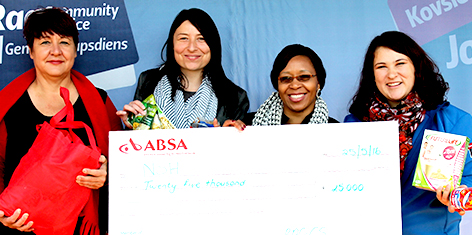Latest News Archive
Please select Category, Year, and then Month to display items
06 April 2018
Photo Rulanzen Martin
 From the left: Dr Thulisile Mphambukeli, leader of the BRICS research team that is exploring the political economy of water and food security, and her research partner, Dr Victor Okorie.
From the left: Dr Thulisile Mphambukeli, leader of the BRICS research team that is exploring the political economy of water and food security, and her research partner, Dr Victor Okorie.
A Brazil, Russia, India, China and South Africa (BRICS) delegation is to hold the 10th Annual BRICS Summit in the last week of May 2018 in Johannesburg. Dr Thulisile Mphambukeli, leader of the University of the Free State (UFS) research team alongside Dr Victor Okorie from the Department of Urban and Regional Planning, in collaboration with Prof Lere Amusan of North-West University, will ensure that water and food security is a prominent feature on the gathering’s agenda.
First, the project titled: “Exploring the political economy of water and food security nexus in BRICS and Africa” will debut at the National Institute for the Humanities and Social Sciences BRICS Think Tank Forum”.
According to Dr Mphambukeli, the key to water security is attitudinal change by means of education and conscientisation. This, she is adamant about, holds the potential to drive behavioural adjustments in the way society interacts with water.
Genetic and social approaches
Dr Okorie asserts that if strides towards reducing the demand for water were to be made, research efforts should be geared towards effecting changes at DNA level. Meaning we need to explore waterwise ways that enable crops and animals to thrive optimally.
The project also looks at social dimensions of water such as flushing a toilet. “Research activities on redesigning toilets, especially the urinal, where more than nine litres of water are used to flush less than one cubic centimetre of urine, are timely in the context of managing water and the food nexus crises,” said Dr Okorie.
Combining the genetic and social approaches would allow us to produce more with a smaller water footprint. This can be made possible by implementing precision agriculture which is about estimating and applying exact quantities of water and nutrients needed for the production of crops or the raising of livestock.
Paradigm shifting policies
Prof Amusan said the team intended to propose functional solutions that take the quality of water into consideration. Equitable production and distribution of water depends on endorsing policies of co-production between citizens, governments and the public sector. BRICS member states mutually consider water and food security as an issue of paramount significance, hence its feature on this prestigious summit’s agenda.
UFS community makes difference through Big Give Project
2016-06-10
 Food for the needy. From left is Annelize Visagie, Health and Wellness;
Food for the needy. From left is Annelize Visagie, Health and Wellness;
Vicky Simpson, No Student Hungry Food Bursary Programme;
Elizabeth Msadu, Health and Wellness; and Lorinda Slippers, Student
Representative Council Rag Community Service, at the handover of
the food and cash collected by the RAG Big Give Project. Photo: Jóhann Thormählen
Thanks to the caring community of the University of the Free State (UFS), students in need were provided for during exams, and will receive more food in the cold winter months.
Once again, staff and students made valuable contributions at the successful RAG Big Give Project, where food contributions of R 38 176.20 and cash donations of R25 000 were received. Staff, residences, and the RAG Committee made these donations as part of the project on 5 May 2016, when contributions were made at the Bloemfontein Campus gates of the UFS. An extra donation by Imperium, a residence on the Bloemfontein Campus, of R20 000 for FutureLife helped to achieve the grand total of food contributions.
According to Vicky Simpson, Assistant Officer at the No Student Hungry Food Bursary Programme (NSH), the food donation is for a designated group of students who have already been identified as food insecure by the social work office. “It will be distributed to them on a monthly basis,” she said.
The handover of food collected was done on 25 May 2016 at the RAG Food store by the RAG Office to Health and Wellness and the NSH. The RAG Office thanked the UFS community for its contributions to the project. Parexel, who made cash and food donations, received special mention. Simpson said “the food will make a huge difference in the lives of students who do not know where their next meal will come from”.
According to Jaco Faul, Senior Assistant Officer Rag CS, his office is already looking forward to the next instalment of the Big Give Project. “We challenge faculties and staff members for the forthcoming Rag Big Give project in October to see if we can beat the amount collected this time.”